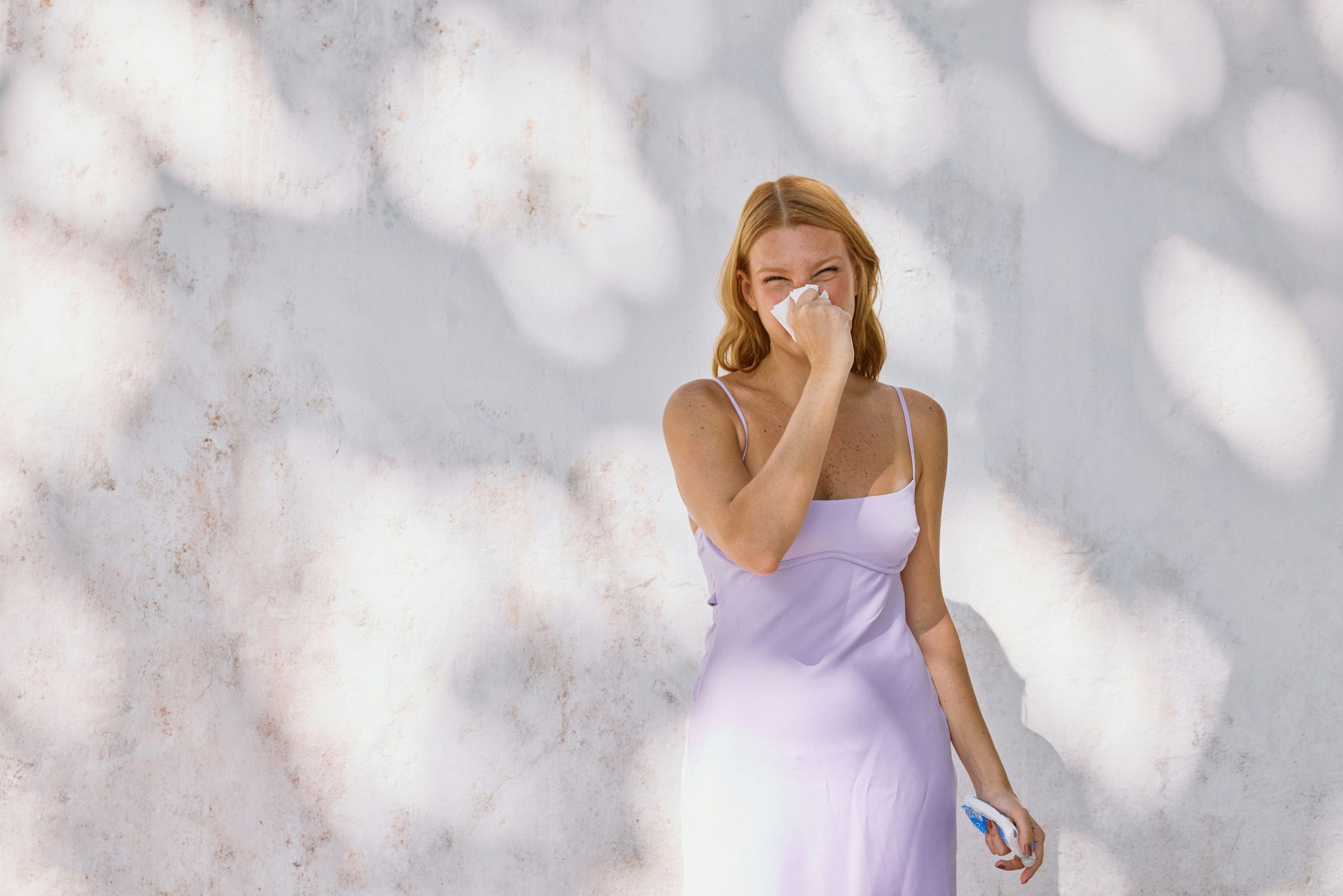21/09/2025
Hassle-Free Hay Fever Relief: Compare Your Treatment Options
Hay fever affects millions of Australians every year. The sneezing, itchy eyes, and blocked nose can really disrupt your daily routine. At Medmate, our Australian-registered doctors help patients across the country find the right treatment through simple online consultations. Whether you need antihistamines, nasal sprays, or eye drops depends on your symptoms and lifestyle. This guide helps you understand each option so you can choose what works best for you.
Understanding Your Hay Fever and Treatment Choices
What Exactly Is Hay Fever?
Hay fever (allergic rhinitis) happens when your immune system reacts to airborne particles like pollen, dust mites, or pet fur. Your body releases chemicals that cause inflammation in your nose, eyes, and throat.
Common symptoms include:
• Sneezing and runny nose
• Itchy, watery eyes
• Blocked nose
• Scratchy throat
• Tiredness from poor sleep
How Different Treatments Help Your Symptoms
Antihistamines: All-Round Relief Delivered
• Older-style antihistamines: diphenhydramine, chlorpheniramine
• Quick (15–30 minutes), may cause drowsiness, last 4–6 hours
• Newer antihistamines: cetirizine, loratadine, fexofenadine
• Less likely to cause drowsiness, last up to 24 hours, take 1–2 hours to work fully
Best for sneezing, runny nose, itchy skin, rashes, and as daily prevention.
Nasal Sprays: Direct Relief Where You Need It
• Steroid sprays: fluticasone, budesonide, triamcinolone
• Reduce inflammation, work best with daily use, full results after 2–4 weeks
• Through Medmate, doctors can prescribe these medicines with e-prescriptions delivered straight to your phone
• Antihistamine sprays: azelastine, olopatadine
• Fast relief within 15–30 minutes
• Decongestant sprays: oxymetazoline
• Immediate effect, but only safe for up to 3 days
Best for blocked nose, congestion, sinus pressure.
Eye Drops: Fast Relief for Itchy Eyes
• Antihistamine drops: ketotifen, olopatadine
• Relief within minutes
• Preventive drops: cromolyn sodium, lodoxamide
• Need 2–4 weeks of use for full benefit
• Combination drops: antihistamine plus preventive effect
Best for itchy, watery, red eyes or light sensitivity.
Comparing How Well Each Treatment Works
Sneezing/runny nose: Nasal sprays (90%), antihistamines (85%)
Blocked nose: Nasal sprays (95%), antihistamines (60%)
Eye problems: Eye drops (90%), antihistamines (70%)
Speed of Relief
• Eye drops: 3–5 minutes
• Decongestant sprays: 5–10 minutes
• Antihistamine tablets: 30–60 minutes
• Steroid sprays: 12–48 hours
Duration
• Newer antihistamines: 24 hours
• Steroid sprays: 24 hours
• Eye drops: 8–12 hours
• Decongestant sprays: 4–12 hours
How to Layer Treatments Based on Symptoms
Mild (occasional sneezing/runny nose only):
• Start with an oral antihistamine (cetirizine, loratadine, or fexofenadine).
Moderate (persistent nose symptoms, congestion, or sinus pressure):
• Add a steroid nasal spray (fluticasone, budesonide, or triamcinolone).
• For quick congestion relief, you can use a decongestant spray (oxymetazoline) for up to 3 days.
Eye-dominant symptoms (itchy, watery, red eyes):
• Add antihistamine eye drops (ketotifen or olopatadine).
• If symptoms occur every season, consider preventive eye drops (cromolyn sodium or lodoxamide).
Severe or multi-symptom hay fever (nose + eyes + general allergy symptoms):
• Combine:
• Daily oral antihistamine
• Daily steroid nasal spray
• Eye drops as needed
Seasonal preparation:
• Begin steroid nasal sprays and preventive eye drops 2–4 weeks before your usual allergy season.
• Keep antihistamines and rescue drops/sprays on hand for breakthrough symptoms.
Special Situations to Consider
• Pregnancy and breastfeeding: loratadine, cetirizine, budesonide nasal spray, cromolyn eye drops may be considered safer — always consult your doctor first. Medmate’s doctors are available 24/7 to discuss safe hay fever treatment during pregnancy.
• Children: cetirizine liquid (from 2 years), many nasal sprays (from 6 years), ketotifen eye drops (from 3 years). Doses should always be adjusted by age and weight.
• Older adults: Prefer non-drowsy antihistamines and check carefully for medicine interactions.
Finding Your Best Treatment Plan
Layering treatments according to your main symptoms gives the best balance of quick relief and long-term control. Start with the simplest option that matches your symptoms, add other treatments if needed, and give each enough time to work.
If pharmacy treatments don’t give enough relief after 2–4 weeks, or if your symptoms affect sleep, work, or daily life, a medical consultation may be needed. Medmate’s online doctors can review your symptoms and prescribe stronger treatment, with e-prescriptions sent directly to your preferred pharmacy across our network of 6,000+ partner pharmacies Australia-wide.
With the right plan, you can enjoy every season without hay fever holding you back.
Your Questions Answered
Can I use antihistamines and nasal sprays together?
Yes, combining antihistamine tablets with nasal sprays is safe and often works better than either alone. They work in different ways – tablets throughout your body and sprays directly in your nose – giving complete relief without extra side effects.
When should I start treatment before allergy season?
Start preventive treatment 2-4 weeks before your usual allergy season for best protection. Steroid nasal sprays and preventive eye drops need time to build up, while antihistamines can start closer to the season.
Why do decongestant sprays cause rebound congestion?
Rebound congestion happens when your nose becomes dependent on decongestant sprays after 3+ days. The blood vessels in your nose forget how to shrink naturally, making congestion worse when you stop.
Are generic medicines as good as brand names?
Generic medicines have the same active ingredients and work just as well as brand versions. They must prove they work identically to get approved, while costing much less.
Can I use eye drops with contact lenses?
Most allergy eye drops need you to remove contacts first and wait 10-15 minutes before putting them back. Preservative-free drops are safer for contact wearers, though daily disposables during allergy season might be easier.
What’s the difference between seasonal and year-round allergies?
Hay fever is seasonal, triggered by pollens at certain times, while year-round allergies come from indoor triggers. Treatment is similar, but year-round allergies need continuous daily medicine rather than seasonal use.
How do I know if I need prescription treatment?
Consider prescription options if pharmacy treatments don’t help after 2-4 weeks of proper use. Severe symptoms affecting sleep, work, or daily life need medical assessment. Medmate’s online doctors can review your symptoms and prescribe the right treatment through a convenient consultation.
Can natural remedies replace hay fever medicines?
While natural options like saline rinses can help, they usually don’t work as well as medicines. Natural approaches work best alongside regular treatments rather than replacing them.
Why do antihistamines make some people drowsy?
People react differently to antihistamines based on their genetics and metabolism. Older antihistamines enter the brain more easily, causing drowsiness, while newer ones are designed to avoid this.
Is long-term use safe?
Most modern hay fever medicines are safe for regular long-term use when taken as directed. Newer antihistamines and steroid nasal sprays have excellent safety records, though regular check-ups help monitor for rare side effects.
What if my treatment stops working?
Medicines can become less effective over time or when allergens change. Try switching between different antihistamines, adjusting timing, or combining treatments with medical guidance to regain control.
Can hay fever treatment help asthma?
Managing hay fever reduces asthma triggers in people with allergic asthma, potentially preventing attacks. Steroid nasal sprays especially help by reducing post-nasal drip and inflammation that can trigger breathing problems.
Recommended reading
Search for a specific topic or filter by categories to find information on what you need to know on the full Medmate Journal

What Are Antihistamines and How Do They Work?
If you experience sneezing fits in spring, itchy skin after contact with something new, or watery eyes around pets, you may have been told to take an antihistamine. But what…
